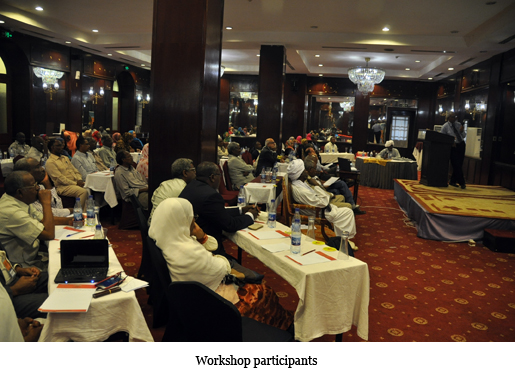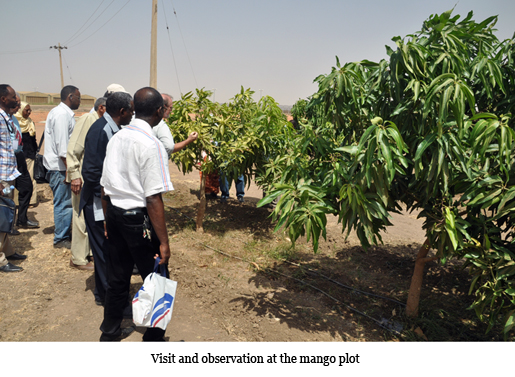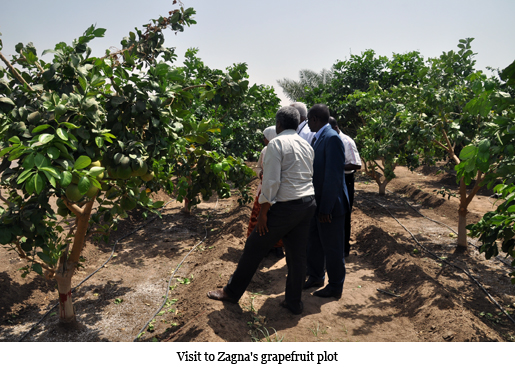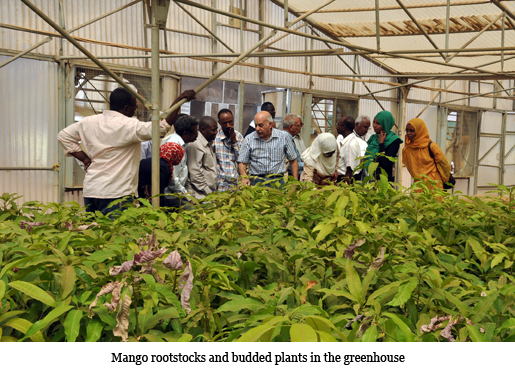The workshop on ‘Enhancing Market Access for Tropical Fruits in East Africa and GCC Countries through Quality Improvement, Proper Post Harvest Handling and Pest and Disease Management’ at the Grand Holiday Villa Hotel, Khartoum, Sudan from 4-5 March 2015 was jointly organized by the International Tropical Fruits Network (TFNet), Ministry of Agriculture and Irrigation, Sudan and the Food and Agriculture Organization of the United Nations (FAO), Kingdom of Saudi Arabia.
[UPDATE: The powerpoint presentations for the workshop can be downloaded here]

The workshop was officially opened by Dr. Jaffar Ahmad Abdullah, State Minister, Ministry of Agriculture and Irrigation, Republic of Sudan.
The workshop was attended by 56 participants comprising Representatives from Embassies of Ethiopia, Uganda, Kenya, Officials from the Ministry of Agriculture and Irrigation Sudan, Universities, Sudan Agriculture Research Corporation, private companies and resource persons from Australia, Egypt, South Africa, Sudan, FAO Kingdom of Saudi Arabia and TFNet.
During the second day of the workshop, a field visit was organized to observe the efforts of a major local company (Zadna) which is involved in the production of planting materials including mango, citrus, date palm and banana.
The main objectives of the workshop are to:
- Assess issues and challenges in developing the tropical fruit industry, taking into account the impact on food security, income generation for smallholders and market access.
- Share recent information on pest and disease management in tropical fruits, especially on awareness of the impact of the wilt disease caused by Fusarium sp in bananas, including the strategies to mitigate and manage the disease
- Share recent information on the effect of fruit flies infestation in tropical fruits, including the strategies to control and manage the pest.
- Share information on the current postharvest technologies that can improve quality and marketability of tropical fruits, as the same time, conform to quality and safety standards to meet consumer’s preferences.
- Develop a strategy and action plan including policy implementation to improve postharvest and quality management and quality and to mitigate effect of pests and diseases (including fruit fly management and Fusarium sp. banana wilt disease), incorporating sanitary and phytosanitary (SPS) and quarantine regulations.
The seven papers presented focused on issues that characterize tropical fruit development in the region. Emphasis was given to the threat of the Fusarium wilt disease on bananas, fruit fly infestation, good practices for mango and the requirements for good quality and safe fruits for market access.
The discussions during the workshop events centred on implementation issues and financing of the various programs in tropical fruit development in the region. Participants also suggested approaches to enhance the areas in research and development, biosecurity and sanitary and phytosanitary requirements (SPS) and capacity building in aspects of production and reduction of postharvest losses.
Summary and Recommendations
- Countries in the region need to be aware and vigilant of the threat of the Fusarium wilt disease on bananas. Biosecurity measures such as movement of planting materials, equipment and personnel should be monitored and checked, since the disease has already been confirmed in Mozambique.
- Emphasis has also to be given in the management of fruit fly through surveillance, monitoring and control including use of baits, and proper field management.
- Preharvest and postharvest activities especially for mango need to be improved for better productivity and reducing losses, through targeted research and development, suitable varieties and enhance capacity building activities to address issues in production and integrated pest management.
- As funding appears to be a major concern, TFNet can take the lead to collaborate with other networks, FAO, countries, agencies in the region and concerned international organizations to propose projects pertaining to the issues discussed, and source for funds for implementation.
That countries in the region join in as members of TFNet



